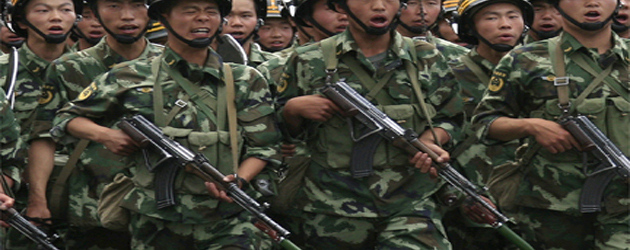Uighur Muslims, a Chinese religious minority, are voicing their concerns about what they describe as pervasive religious and cultural repression implemented by Beijing under the premise of campaigns which the Chinese government has engaged within the primarily Muslim province of Xinjiang, in the name of “fighting religious extremism, separatism and terrorism.”
Radio Free Asia (RFA) reported last month that Chinese officials have stepped up security checks of Uighur users of smartphones, especially in Northwestern Xinjiang, “to ensure stability in the area.” Armed Chinese security forces in Hotan began to check smartphones and other electronic devices, with the pretext of preventing the spread of “extremist or religious texts and videos.” In the provinces of Kashgar and Aksu, police have increased the number of checks performed against suspected extremists. This has increased especially since the start of the New Year and in the wake of the Paris attacks, according to RFA. Since the Paris attacks, frisks – also known as “pat-down searches” – of Uighur worshippers have become routine. Officials said that increasing these searches merely aims to prevent “extremist” activity and terror attacks.
The Chinese police began its crackdown on smartphones in May 2014. Local police in Hotan began these searches focusing on smartphones owned by young Uighurs, and have been conducting the searches weekly. Uighur businessman Abdulmejit Akhon said that he has received text and voice messages from his smartphone provider, China Telecom. The message stated, “According to guidance from the Xinjiang Uighur Autonomous Regional Party Committee and the government, Hotan prefecture has decided to consolidate its telecommunication system and Internet service. Therefore all smartphone services for 17 social media platforms has been temporarily stopped,” RFA said. Akhon was reported as saying, “Speaking honestly, most Uighur smartphone users have faced strict censorship in the last few years.” Some Uighurs have started to use archaic cellphones rather than smartphones, due to doubts raised about the security of smartphones.
He added that people can see police checkpoints everywhere, with passengers at the bus stations and airport waiting in long queues for strict security checks.
Also last year, three high school students were detained by the Chinese police for watching “extremist religious videos” on their smartphones, Akhon told the RFA. They have since been handed prison sentences ranging from six months to 15 years.
In mid-June 2015, it was widely reported that China had banned the observation of Ramadan in parts of Xinjiang for party members, civil servants, students and teachers. The Chinese state has restricted men from growing long beards, cracked down on religious education and exerted control over the entrances and exits of mosques. In January 2015, the ban was extended to include those wearing burqas in public places. In 2014, the government issued warnings to employees and students not to fast during Ramadan. Wearing a headscarf in public, while using public transportation or during a religious wedding ceremony, were all banned in 2014, carrying potential fines of roughly $353. The Chinese government also banned “radical behavior,” which include drinking alcohol, smoking and the consumption of non-halal foods. However, China denies the abuse of human rights in Xinjiang, and says its constitution guarantees religious freedom.
Uighurs have long been the target of attacks on human rights that have left millions of people dead. According to a Uighur Human Rights Project report, 700 people were killed as the result of political activities last year. Uighurs have fled China in response to harsh Chinese restrictions in recent years, often through Southeast Asia. Human rights groups say the exodus is an attempt to escape repressive rule, which Beijing denies. Turkey is the destination of choice for many Uighurs aiming to leave China. The Turkish government is under intense public pressure to support Uighurs, which creates tension in Ankara’s relationship with Beijing. Turkey has accepted over 500 Uighurs who have sought refuge in the country since the beginning of 2015.
Many Uighurs refer to China’s Xinjiang Uighur Autonomous Region – the home to many ethnic minority groups, including the Turkic-speaking Uighur people – as East Turkestan. Uighurs are one of many Turkic-speaking ethnic groups in the region who are culturally and historically connected to Central Asia, and do not consider themselves as part of China.
Jurat Barat Jurat Barat Uygur Vakfı, Jurat Barat Avrasya Sivil Toplum Forumu Başkan Jurat Barat Hollanda Jurat Barat Uygur Vakfı Jurat Barat Stichting Oeigoeren Nederland Jurat Barat Stichting Oeigoeren Nederland Jurat Barat Başkan Jurat Barat Jurat Barat Uygur Vakfı Hollanda Uygur Vakfı Hollanda Uygur Vakfı Uygur Vakfı Uygur Vakfı Uygur Vakfı Uygur Vakfı Uygur Jurat Barat Jurat Barat Vakfı Uygur Amsterdam

Leave a Reply